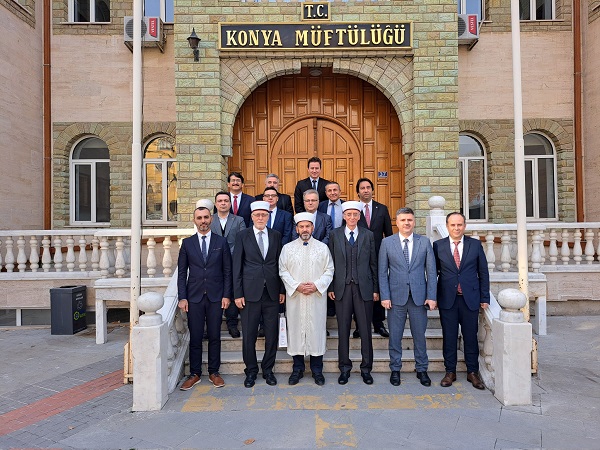
Ankara’s choice to open all fronts with Greece and use the minority issue, not only as leverage in bilateral relations, but also to harness it in light of the elections in Greece, was highlighted in yesterday’s meeting. Mevlüt Çavuşoğlu, the Turkish Foreign Minister, together with members of the militant minority, members of the so-called “Higher Advisory Committee of the Turks in Western Thrace”.
The advisory delegation headed by the false muftis Ibrahim Sharif and Mustafa Trumpa and the head of the minority party, Sigdim Asafoglu, was in Turkey to attend a religious ceremony in memory of the Muslim poet and mystic Mevlana, and on this occasion they made a series of contacts with as well as the Turkish Foreign Minister M. Cavusoglu.
The Turkish Foreign Minister did not miss the opportunity to promote this meeting by launching a direct attack on Greece for the alleged violation of the rights of the “Turkish minority”, sending a message that Ankara insists on keeping the issue of the minority at the top of the agenda.
“We have hosted eminent members of the Advisory Committee of the Turkish Minority in Western Thrace in Ankara. Greece continues its continuous violation of the Treaty of Lausanne and the basic human rights of the Turkish minority. Our brothers and sisters in Western Thrace have never been and never will be alone!” He quoted at the same time a list of “violations” of the rights of the “Turkish minority”.

“Turkey once again distorts the reality in Thrace… We call on it, instead of offering lessons in human rights, to put its house in order and implement policies that will once again give breath and vitality to the Greek minority there,” said a statement from the Greek Ministry of Foreign Affairs.
Athena raises a question that Turkey “recalls Lausanne and talks about Greece’s violation of it, at a time when the Greek minority in Constantinople was less than 3,000 people, while at the time of signing the treaty it numbered about 130,000 people. At a time when the Muslim minority in Thrace numbered its members About 120,000 members, the same number as the period in which the Treaty of Lausanne was signed, which Turkey systematically invokes.
“It is at least an oxymoron, for a country that has the worst performance on human rights issues, to leave Greece for violating the rights of the Muslim minority in Thrace,” noted the Greek Foreign Ministry.
Recently, Ankara has been trying to bring the minority to the fore, among other things, to rally minority votes around the groups controlled by the Turkish consulate, in order to have a more active role in the well-known behind-the-scenes of compromising that always takes place before national or municipal elections in Greece.
The minority party KIEF, which seeks to have a presence mainly in European elections, and which scores high in Xanthi and Rodopi, tends not to reveal itself in national elections, giving the Turkish consulate the opportunity to direct deals through “representatives” with the parties Greek.
Indeed, the fact that the ruling majority in Greece could count on only a few seats gave impetus to the mobilization in order to manipulate minority votes and thus strengthen the influence of the Turkish factor in domestic political developments.
The list published by Mr. Tsavusoglu lists known cases related to the ban on the use of the term “Turkish” in the names of associations and foundations, the violation of decisions of the European Court of Human Rights on the establishment of associations, and about the non-election of muftis. Concerning the management of endowment properties and minority schools and requesting an increase in work permits for Turkish teachers. Mr. Cavusoglu even added “excessive financial controls and arbitrary taxation” to the list of “discrimination” against the minority!

“Hipster-friendly coffee fanatic. Subtly charming bacon advocate. Friend of animals everywhere.”





More Stories
F-16 crashes in Ukraine – pilot dies due to his own error
Namibia plans to kill more than 700 wild animals to feed starving population
Endurance test for EU-Turkey relations and Ankara with Greece and Cyprus